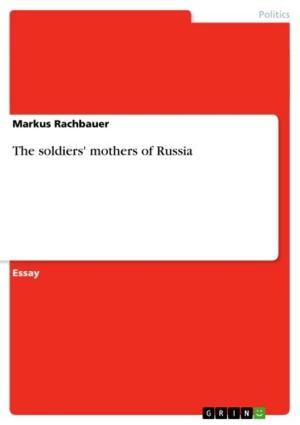Love Me or Kill Me
The Predominance of Love over Violence in 'Cleansed and Crave' by Sarah Kane
Fiction & Literature, Literary Theory & Criticism, British| Author: | Hanna Kubowitz | ISBN: | 9783640985364 |
| Publisher: | GRIN Publishing | Publication: | August 16, 2011 |
| Imprint: | GRIN Publishing | Language: | English |
| Author: | Hanna Kubowitz |
| ISBN: | 9783640985364 |
| Publisher: | GRIN Publishing |
| Publication: | August 16, 2011 |
| Imprint: | GRIN Publishing |
| Language: | English |
Seminar paper from the year 2003 in the subject English Language and Literature Studies - Literature, grade: 1.5, University of Freiburg (Englisches Seminar), course: Hauptseminar: British Drama after 1945, language: English, abstract: 'From first to last [the] play is concerned with sexual and physical violence. (...) Nobody (...) will deny that it is the function of the theatre to reflect the horrific undercurrents of contemporary life. But it cannot be allowed, even in the name of freedom of speech, to do so without aim, purpose or meaning.' '[The play] isn't just disgusting, it's pathetic (...) a lazy, tawdry piece of work without an idea in its head beyond an adolescent desire to shock.' Accusations like these give evidence of how emotional, outraged, and hysterical theatre critics react when challenged by unexpectedly shocking and indigestible performances. It may come as a surprise that the above extracts are neither part of one single critique, nor do they refer to one single play. The first quote refers to Edward Bond's Saved (1965), whereas the second one refers to the late Sarah Kane's Blasted (1995). Not incidentally, both playwrights were accused by numerous irritated critics of committing the same unacceptable affront: They were reproached for depicting the most disgusting forms of violence on stage, merely for the sake of paying tribute to violence itself. .... 'Violence shapes and ob¬sesses our society, and if we do not stop being violent we have no future (...) It would be immoral not to write about violence' (Bond 1978: 3). Although accepting and in fact admiring Bond's decision to comment on his own work, Sarah Kane was always very reluctant about making 'authorised' statements concerning her work. Nevertheless, she did provide equally comprehensible or even convincing reasons for putting violence on stage: 'If you are saying you can't represent something, you are saying you can't talk about it, you are denying its existence, and that's an extraordinarily ignorant thing to do.' Yet, paradoxical as it might seem,considering this apparent commitment to the representation of violence, violence is only a marginal topic in all of Kane's plays. ... Based on an analysis of the 1998 play Cleansed, this paper aims at a reassessment and revaluation of Sarah Kane's work: Violence - both physical and emotional - is an important ingredient, and yet only a minor theme in the plays. It is dominated by the all-encompassing theme of love. Love and violence, however, are not examined as two separate individual experiences. On the contrary, it is their overlapping that is scrutinised.
Hanna Kubowitz studierte Englische Philologie und Neuere Deutsche Literaturgeschichte (mit etwas Soziologie und Politikwissenschaft) an der Albert-Ludwigs-Universität Freiburg und an der University of Birmingham, England. Sie lebt und arbeitet in Süddeutschland.
Seminar paper from the year 2003 in the subject English Language and Literature Studies - Literature, grade: 1.5, University of Freiburg (Englisches Seminar), course: Hauptseminar: British Drama after 1945, language: English, abstract: 'From first to last [the] play is concerned with sexual and physical violence. (...) Nobody (...) will deny that it is the function of the theatre to reflect the horrific undercurrents of contemporary life. But it cannot be allowed, even in the name of freedom of speech, to do so without aim, purpose or meaning.' '[The play] isn't just disgusting, it's pathetic (...) a lazy, tawdry piece of work without an idea in its head beyond an adolescent desire to shock.' Accusations like these give evidence of how emotional, outraged, and hysterical theatre critics react when challenged by unexpectedly shocking and indigestible performances. It may come as a surprise that the above extracts are neither part of one single critique, nor do they refer to one single play. The first quote refers to Edward Bond's Saved (1965), whereas the second one refers to the late Sarah Kane's Blasted (1995). Not incidentally, both playwrights were accused by numerous irritated critics of committing the same unacceptable affront: They were reproached for depicting the most disgusting forms of violence on stage, merely for the sake of paying tribute to violence itself. .... 'Violence shapes and ob¬sesses our society, and if we do not stop being violent we have no future (...) It would be immoral not to write about violence' (Bond 1978: 3). Although accepting and in fact admiring Bond's decision to comment on his own work, Sarah Kane was always very reluctant about making 'authorised' statements concerning her work. Nevertheless, she did provide equally comprehensible or even convincing reasons for putting violence on stage: 'If you are saying you can't represent something, you are saying you can't talk about it, you are denying its existence, and that's an extraordinarily ignorant thing to do.' Yet, paradoxical as it might seem,considering this apparent commitment to the representation of violence, violence is only a marginal topic in all of Kane's plays. ... Based on an analysis of the 1998 play Cleansed, this paper aims at a reassessment and revaluation of Sarah Kane's work: Violence - both physical and emotional - is an important ingredient, and yet only a minor theme in the plays. It is dominated by the all-encompassing theme of love. Love and violence, however, are not examined as two separate individual experiences. On the contrary, it is their overlapping that is scrutinised.
Hanna Kubowitz studierte Englische Philologie und Neuere Deutsche Literaturgeschichte (mit etwas Soziologie und Politikwissenschaft) an der Albert-Ludwigs-Universität Freiburg und an der University of Birmingham, England. Sie lebt und arbeitet in Süddeutschland.















